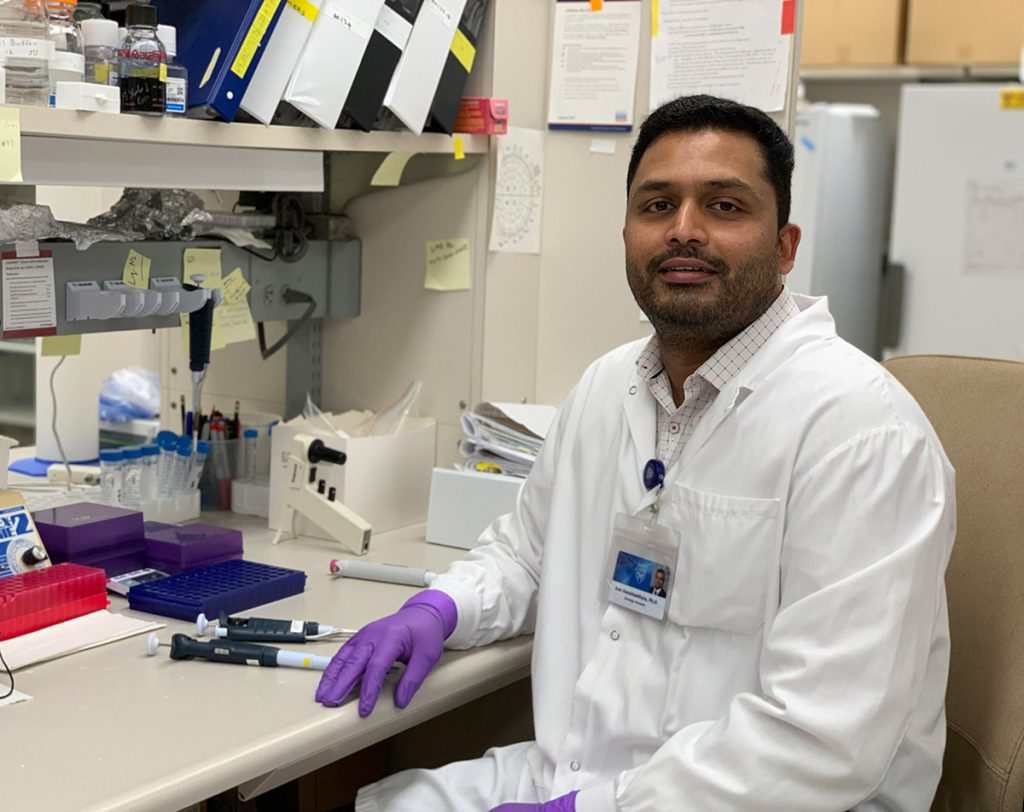
Dr. Arun Kanakkanthara, of Mayo Clinic, is a 2021 recipient of OCRA’s Liz Tilberis Early Career Award. With his project, “Exploiting a Metabolic Dependency of PARPinhibitor-Resistant Ovarian Cancer,” Dr. Kanakkanthara is investigating ways to overcome tumor resistance to PARP inhibitors, a critical issue in ovarian cancer treatment.
What initially sparked your interest in science?
Science has always been on my radar from a very young age. My parents were both employed at a university. Although they were not in science fields, through them I came to know and meet a lot of individuals who were involved in STEM fields, and I was always fascinated by what they were doing. I vaguely remember, back when I would have been around the age of 8 or 9, wishing to discover a wonder drug to completely cure asthma, the worst of all ailments that I had suffered during my childhood. But at the time, I never thought I could or would become a researcher. It was around the time of my graduation from school that the field of biotechnology started gaining prominence in my country and when this opportunity presented itself, I knew it was what I wanted to do. There started my passionate and promising journey to becoming a scientist. I am truly grateful for my family, mentors, and the great opportunities that helped shape my career in science.
What drew you to the field of ovarian cancer research?
To be frank, I didn’t set out to have a career specifically in ovarian cancer research — it just happened through my training. As a PhD student, my study was focused on understanding how ovarian cancer cells become resistant to chemotherapies. This research opened my mind to the complexity of ovarian cancer and the need for new treatment options to tackle it. Ovarian cancer remains the most lethal form of gynecologic malignancies, so I find it rewarding that my research in ovarian cancer could positively impact the lives of the many women who face this disease.
Can you explain your research project?
Ovarian cancer is difficult to treat mainly because these tumors are often detected late. On top of this, over 80% of ovarian cancer patients develop tumor resistance to chemotherapy — meaning the cancer no longer responds to the drugs being given — and the patient dies of the disease. The group of drugs categorized as PARP inhibitors have recently emerged as an exciting new class of therapy for ovarian cancer. But the cancer cells are super tricky — they have started to show resistance to PARP inhibitors as well. Accordingly, the central goal of our study is to identify and test new ways to kill ovarian cancer cells that have become resistant to PARP inhibitors. Cancer cells, in most cases, alter their energy supply chains to meet the high energy demands during tumor growth. In our studies, we have discovered an important energy source that the PARP inhibitor-resistant cells rely on for their everyday survival, as well as for resisting the action of PARP inhibitors. We are now exploring if we can utilize this energy source as a potential new drug target to starve PARP inhibitor-resistant tumor cells to death, thus eventually helping to improve the survival of women with ovarian cancer.
What motivates you to persist in your research?
Despite significant therapeutic advances over the past decade, the unfortunate reality is that ovarian cancer remains an incurable disease. I am inspired by believing that there is still plenty of cancer-specific alterations, like the altered energy metabolism mentioned earlier, which we may be able to exploit to curb ovarian cancer. In their own way, my wife and our two daughters (a 5-year and a 3-year-old; yes, I am outnumbered!) also motivate me. Every now and then my kids ask me, “Papa, did you find a cure for cancer?” It sets a high bar for me and pushes me to work hard to gain more insights that can be leveraged for new, more effective ovarian cancer treatments. I would like to show them that anything is obtainable if you are passionate about it and work hard for it.
What is your hope for the field of ovarian cancer research?
I have no doubt that the future of ovarian cancer research is of tremendous promise. Novel findings are constantly being made to improve detection and effective therapeutic discovery, as well as patient stratification for individualized treatment approaches. Altered energy metabolism is emerging as a potential anticancer drug target. Unfortunately, it remains unclear if there is any druggable metabolic rewiring in ovarian cancer cells that have acquired resistance to PARP inhibitors. My research group is excited to push the boundaries of ovarian cancer research by utilizing innovative approaches and mouse models carrying human ovarian tumors to identify and test new therapeutic options that exploit metabolic dependencies and vulnerabilities of PARP inhibitor-resistant ovarian cancer cells.
If you had the opportunity to personally thank someone from the OCRA community who supported your work, what would you say?
I can’t thank you enough for your amazing generosity. The support of OCRA’s community will get us closer to a new therapy for ovarian cancer.
See more OCRA-funded research projects focused on drug resistance and PARP inhibitors.


